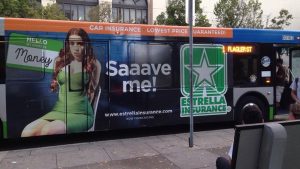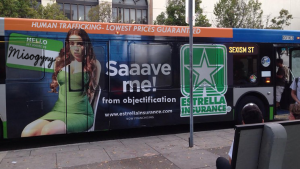Original Ad:

Explanation:
This ad was marketed on Miami buses with the message to save money on insurance by signing up with Estrella. The woman portrayed, named “Money”, is donned in a short green dress and is bound to a chair while pleading “Saaave me!” Upon deconstructing this ad, we see that it not only objectifies woman by personifying her as money, it also devalues women to the status of playthings that are replaceable and expendable in the same way that money is. These indirect messages to society set a tone on how people can treat women. By labeling the woman as money, it suggests that her body is never really hers. It is something that can be used, earned and dominated, likely at the hands of a man. The portrayal of a kidnapped woman being tied up also indirectly perpetrates rape culture and human trafficking. “Money” is put in a submissive position with physical restraints that prevent her from saving herself. Vulnerable areas on the body like the neck, chest and midsection are exposed and opened up in such a way that emphasizes her powerlessness. It implies that she is helpless in a dangerous situation and can only look beautiful in her dress while waiting for someone to rescue her. Sexism comes into play as she is depicted as a victim that needs constant saving. This position and label would be uncommon in a male’s perspective. It is worth highlighting the location in which these ads were posted as the US has one of the highest rates of human trafficking in the world (Keiper, 2019). The fear of rape culture is a prominent reality for many women in the US. The ad sexualizes something as severe as human trafficking by revealing cleavage, bare shoulders and legs. The woman’s provocative appearance in a tight green dress while being tied up glorifies human trafficking and glosses over the stigma and pain that women go through. Victims and survivors of human trafficking often suffer abuse, exploitation, depression, suicidal tendencies and post-traumatic stress disorders. Nowhere in this ad shows the violence, struggle and trauma that come with kidnapping and human trafficking.
Jammed Ad:

Explanation:
My intention is to provoke discussion on the issues of sexism, misogyny, objectification, human trafficking and rape culture that the advertisement both directly and indirectly implies. Instead of fixing the ad, I emphasize gender role dysfunctions in the form of a parody to promote a social cause. By changing the woman’s name to “Misogyny”, it removes the degrading comparison of women to dispensable objects like money that are used at a man’s convenience. “Money” is no longer there to entertain and fulfill the pleasures of men. In addition, it eliminates the hidden message that women are incapable of economic power. The implication that women need saving when it comes to money and finances is harmful in the aspect of equal independence, but also in the face of defeating stereotypical gender roles. Women can be breadwinners as well. This leads me to the next change on the ad, the destination on the bus, which is now going to “Sexism St.” The “Saaave me! from objectification” is a message to the public, to realize the prevalent objectification of women in mass media. Transparent violence and mock assault that depict women as playthings are typical in advertisement. In the jammed version, the woman is still bound to a chair. However, I blatantly add the label, “human trafficking—lowest prices guaranteed”, to mock the glorified helpless position that the woman is in. With this new label, it lends a new meaning to the woman’s exposed skin and seductive appearance as it forces consumers to think about human trafficking cases that involve sexual exploitation. Instead of seeing her in a provocative way, it exposes the extent to which women are objectified and hyper-sexualized. Although technology and media are constantly advancing to new levels, it is dangerous as well, considering the speed at which messages are spread. Whether we’re conscious of the impact of media or not, it is the main form of communication in a capitalist society and has the power to influence and shape social attitudes on the roles and status of women. The representations of gender roles in ads are important as it can reinforce, justify or trivialize violence against women and thus we must raise our standards to reflect our values in media.
Works Cited
Angeles, Maria de Los. “Quick, Somebody ‘Saaave’ Miami From Estrella Insurance’s Sexist Ads!” Miami New Times, 4, 13 Apr. 2017, https://www.miaminewtimes.com/arts/estrella-insurances-sexist-la-platica-ads-are-embarrassing-and-dangerous-to-miami-9272107.
Keiper, Andrew, and Perry Chiaramonte. “Human Trafficking in America among Worst in World: Report.” Fox News, FOX News Network, 23 June 2019, https://www.foxnews.com/us/human-trafficking-in-america-among-worst-in-world-report.